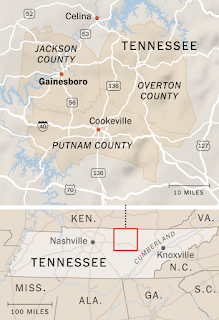 |
| Part of Tennessee's Upper Cumberland region (New York Times map) |
"Economists have long voiced fear that rural places like this are being left behind. The last of the textile businesses, once an economic mainstay, departed in the 1990s. Jackson County and several other counties in the Upper Cumberland [named for the river] are considered 'distressed' or 'at risk' by the Appalachian Regional Commission. But the newcomers are fueling a boomlet in the area, based on a simple economic proposition: It is pretty, and it is cheap. While Jackson County’s typical household makes $35,207 a year, just over half the national average, the low cost of living allows residents to punch far above their weight in economic terms."
The natural beauty of Tennessee's Upper Cumberland region brings in outsiders too. "It has long drawn summer tourists for hunting and fishing, as well as retirees who come from as far away as Ohio to settle among the rivers, lakes and hollers," Porter reports.
Tennessee Technological University in Cookeville is another draw. The 10,000-student school added more than 7,300 jobs to the Upper Cumberland region in the 2019-2020 academic year, and contributed an estimated $860 million to the regional economy, Porter reports. Many workers are drawn to the area by the promise of remote work jobs, affordable housing, and a reasonable commute to Nashville.
Blue-collar workers can prosper in the Upper Cumberland far more than their big-city counterparts, too, thanks to the lower cost of living. "Workers without a four-year college degree earn little in the Cookeville commuting zone — their income puts them among the poorest 10 percent of households in hundreds of commuting zones across the country," Porter reports. "After adjusting for the local cost of living, however, their purchasing power rises to the top 10 percent.
The region's economic turnaround could provide an example for other rural areas to reverse decline, but "whether the area’s budding prosperity will continue remains an open question. The explosion in sales filling the coffers in Jackson and Putnam Counties was propelled in part by the multitrillion-dollar economic rescue packages passed by Congress in 2020 and 2021. That stimulus is largely over," Porter reports. "It is also unclear how big and permanent a change remote work will bring about in the Upper Cumberland. Some early research suggested that the workers who were leaving cities during the pandemic mainly moved to nearby suburbs and exurbs."
No comments:
Post a Comment